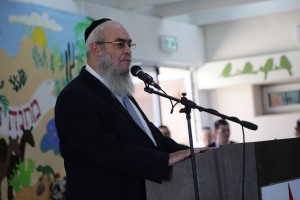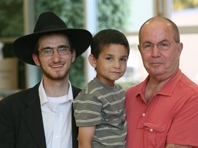
The many tragedies that Rabbi Chollak, founder of Ezer Mizion, is exposed to in the course of his work did not immunize him against the personal tragedy that struck: About three years ago, Leah, his wife and the mother of his sixteen children, passed away after battling cancer. She was 57. From the start, the doctors had said that for her kind of cancer, you can usually stretch things out for about eight years. Sadly, it did not take even that long; she died a little over a year later.
“I have been asked difficult questions,” says Rav Chollak, “For instance: You and your wife took care of so many sick people, and now, she herself succumbed to the illness. Do you feel any anger?
“My answer is: ‘Look, I don’t know any more than you do. Hashem (G-d) does only good, so it cannot be that He did something not good to me. We are merely human beings and it is clear to me that there are things that cannot be understood by the human mind. It’s our job to be good people. Nothing more. Nothing less.”
Rav Chollak idolized his wife. “It is important for me to stress that Leah z”l built Ezer Mizion together with me, with her own hands. I didn’t do anything alone. She was a great woman, full of life wisdom. If she had not dedicated herself to this project – it definitely would not have been able to grow and develop with the systematic, all-embracing programs that help the patient from those first terrifying moments to the happy ending that they pray for.
“It often begins with a woman becoming ill. She needs medical counseling, a caring professional to ‘hold her hand’ to determine what to do next. Sometimes she can be confronted with an appointment for a crucial test being made for three months hence. We make it our job to change that absurd appointment to something closer.

“The children at home are going through a difficult time with their parents unable to be there for them, physically or emotionally. We try to take over in many, many different ways. A Bar Mitzvah where there would otherwise not be one… a trip to buy school supplies…someone to do homework with the kids…a center with professional therapeutic activities… family retreats…and, most important, someone to talk to. I give my cell phone out to a lot of kids who need it and tell them to call me whenever they like. They know I care so they’re not shy.
“We have programs for the parents, everything from professional therapy and support groups to fun days and trips. Having personally experienced this challenge of a sick spouse, I know exactly what it means to see the person closest to you suffering and fighting a battle for life. It tears the heart to the core,” he sighs.
“Services are provided to all applicants,” Rabbi Chollak stresses. “The entire range of the Jewish people comes to us – secular, religious, Chareidi, everybody.

“You see it tangibly at the meetings of stem cell donors and their recipients. They embrace emotionally – a secular fellow who saved the life of a Chareidi, a Dati-Leumi who saved an irreligious person.” And you see it very powerfully at our summer retreats, how everyone spends time together in amazing unity. We are all brothers in times of misfortune.
Rabbi Chollak recalls how, at one of the retreats, a mother from a kibbutz said defiantly, ‘I am irreligious and an extreme Leftist. When I came to the retreat, I was afraid that you’d try to convert me into a baalat teshuvah (a religious Jew). Now I see that all you want is that we should enjoy ourselves at the retreat. Excuse me, I just can’t understand – why is it important to you that I should be happy?’
Perhaps Rav Chollak has found the key to bringing the irreligious closer to their own heritage: caring, sensitivity, understanding and a deep desire to give to others.
